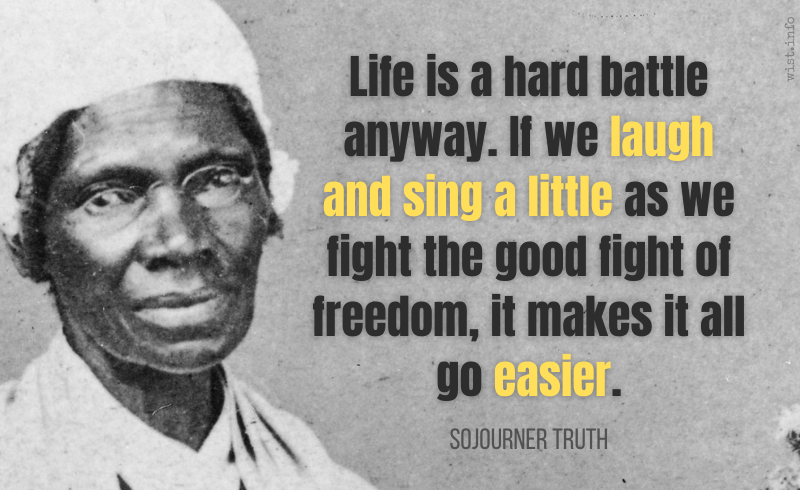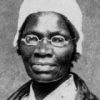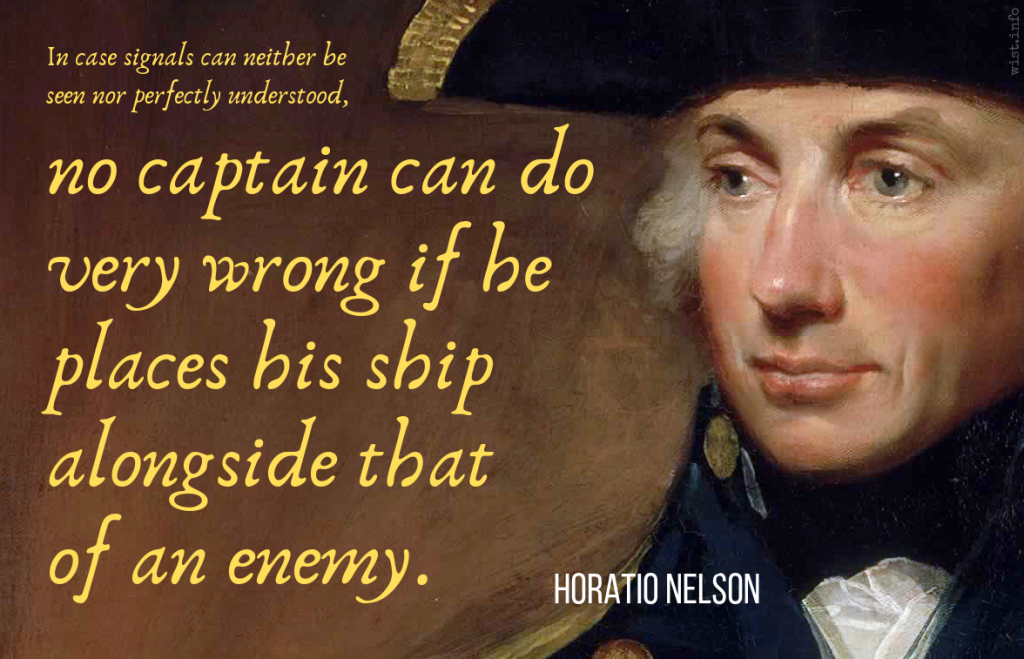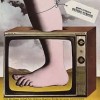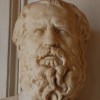VOLUMNIA: Hear me profess sincerely: had I a dozen sons, each in my love alike and none less dear than thine and my good Martius, I had rather had eleven die nobly for their country than one voluptuously surfeit out of action.
William Shakespeare (1564-1616) English dramatist and poet
Coriolanus, Act 1, sc. 3, l. 21ff. (1.3.21) (c. 1608)
(Source)
"Voluptuously surfeit out of action" = to die indulgent, idle, and lazy
Quotations about:
battle
Note not all quotations have been tagged, so Search may find additional quotes on this topic.
Surprise becomes effective when we suddenly face the enemy at one point with far more troops than he expected. This type of numerical superiority is quite distinct from numerical superiority in general: it is the most powerful medium in the art of war.
[Die Überraschung zeigt sich dadurch wirksam, dass man dem Feinde auf einem Punkt viel mehr Truppen entgegen stellt, als er erwartete. Diese Überlegenheit der Zahl ist von der allgemeinen sehr verschieden, sie ist das wichtigste Agens der Kriegskunst.]
Karl von Clausewitz (1780-1831) Prussian soldier, historian, military theorist
On War [Vom Kriege], Book 6, ch. 2 “The Relations of the Offensive and Defensive to Each Other in Tactics [Wie verhalten sich Angriff und Verteidigung in der Taktik zueinander]” (6.2) (1832) [tr. Howard & Paret (1976)]
(Source)
(Source(German)). Alternate translations:
The surprise produces an effect by opposing to the enemy a great many more troops than he expected at some particular point. The superiority in numbers in this case is very different to a general superiority of numbers; it is the most powerful agent in the art of war.
[tr. Graham (1873)]
The suprise produces an effect by opposing to the enemy at some particular point a great many more troops than he expected. The superiority in numbres in this case is very different from the general superiority of numbers; it is the most powerful agent in the art of war.
[tr. Jolles (1943)]
Fighting is like champagne. It goes to the heads of cowards as quickly as of heroes. Any fool can be brave on a battlefield when it’s be brave or else be killed.
Margaret Mitchell (1900-1949) American author and journalist.
Gone with the Wind, ch. 31 [Ashley] (1936)
(Source)
Everywhere, wrenching grief, everywhere, terror
and a thousand shapes of death.[Crudelis ubique
Luctus, ubique pavor, et plurima mortis imago.]Virgil (70-19 BC) Roman poet [b. Publius Vergilius Maro; also Vergil]
The Aeneid [Ænē̆is], Book 2, l. 368ff (2.368-369) (29-19 BC) [tr. Fagles (2006), ll. 461-462]
(Source)
On the fighting in the streets of Troy. (Source (Latin)). Alternate translations:
In all parts cruell grief, in all parts feare,
And various shapes of death was every where.
[tr. Ogilby (1649)]
All parts resound with tumults, plaints, and fears;
And grisly Death in sundry shapes appears.
[tr. Dryden (1697)]
Every where is cruel sorrow, every where terror and death in thousand shapes.
[tr. Davidson/Buckley (1854)]
Dire agonies, wild terrors swarm,
And Death glares grim in many a form.
[tr. Conington (1866)]
And everywhere are sounds of bitter grief,
And terror everywhere, and shapes of death.
[tr. Cranch (1872), l. 506-507]
Everywhere is cruel agony, everywhere terror, and the sight of death at every turn.
[tr. Mackail (1885)]
Grim grief on every side,
And fear on every side there is, and many-faced is death.
[tr. Morris (1900)]
All around
Wailings, and wild affright and shapes of death abound.
[tr. Taylor (1907), st. 49, l. 440-41]
Anguish and woe
were everywhere; pale terrors ranged abroad,
and multitudinous death met every eye.
[tr. Williams (1910)]
Everywhere sorrow,
Everywhere panic, everywhere the image
Of death, made manifold.
[tr. Humphries (1951)]
All over the town you saw
Heart-rending agony, panic, and every shape of death.
[tr. Day Lewis (1952)]
And everywhere
are fear, harsh grief, and many shapes of slaughter.
[tr. Mandelbaum (1971), l. 497-98]
Grief everywhere,
Everywhere terror, and all shapes of death.
[tr. Fitzgerald (1981)]
Bitter grief was everywhere. Everywhere there was fear, and death in many forms.
[tr. West (1990)]
Cruel mourning is everywhere,
everywhere there is panic, and many a form of death.
[tr. Kline (2002)]
Raw fear
Was everywhere, grief was everywhere,
Everywhere the many masks of death.
[tr. Lombardo (2005)]
All around were bitter grief and fear, and different scenes of death.
[tr. Bartsch (2021)]
But let us die, go plunging into the thick of battle.
One hope saves the defeated: they know they can’t be saved![Moriamur et in media arma ruamus.
Una salus victis, nullam sperare salutem.]Virgil (70-19 BC) Roman poet [b. Publius Vergilius Maro; also Vergil]
The Aeneid [Ænē̆is], Book 2, l. 353ff (2.353-354) [Aeneas] (29-19 BC) [tr. Fagles (2006), l. 443ff]
(Source)
(Source (Latin)). Alternate translations:
Then let's incounter death, fall bravely on,
Vanquish'd men's safety is to hope for none.
[tr. Ogilby (1649)]
Then let us fall, but fall amidst our foes:
Despair of life the means of living shows.
[tr. Dryden (1697)]
Let us meet death, and rush into the thickest of our armed foes. The only safety for the vanquished is to throw away all hopes of safety.
[tr. Davidson/Buckley (1854)]
Come -- rush we on our fate.
No safety may the vanquished find
Till hope of safety be resigned.
[tr. Conington (1866)]
Let us die,
And plunge into the middle of the fight.
The only safety of the vanquished is
To hope for none.
[tr. Cranch (1872)]
Let us die, and rush on their encircling weapons. The conquered have one safety, to hope for none.
[tr. Mackail (1885)]
Fall on a very midst the fire and die in press of war!
One hope there is for vanquished men, to cherish hope no more.
[tr. Morris (1900)]
Forward, then,
To die and mingle in the tumult's blare.
Sole hope to vanquished men of safety is despair.
[tr. Taylor (1907), st. 47, l. 421ff]
Let us fight
unto the death! To arms, my men, to arms!
The single hope and stay of desperate men
is their despair.
[tr. Williams (1910)]
Let us die, and rush into the midst of arms. One safety the vanquished have, to hope for none!
[tr. Fairclough (1916)]
So let us die,
Rush into arms. One safety for the vanquished
Is to have hope of none.
[tr. Humphries (1951)]
Let us die, let us charge into the battle's heart!
Losers have one salvation -- to give up all hope of salvation.
[tr. Day Lewis (1952)]
Then let
us rush to arms and die. The lost have only
this one deliverance: to hope for none.
[tr. Mandelbaum (1971), l. 477ff]
Come, let us die,
We'll make a rush into the thick of it.
The conquered have one safety: hope for none.
[tr. Fitzgerald (1981), l. 470ff]
Let us die. Let us rush into the thick of the fighting. The one safety for the defeated is to have no hope of safety.
[tr. West (1990)]
Let us die and rush into battle.
The beaten have one refuge, to have no hope of refuge.
[tr. Kline (2002)]
All that is left for us
Is to rush onto swords and die. The only chance
For the conquered is to hope for none.
[tr. Lombardo (2005)]
Let us die even as we rush into the thick of the fight. The only safe course for the defeated is to expect no safety.
[Routledge (2005)]
Let's die by plunging into war. Our only refuge is to have no hope of refuge.
[tr. Bartsch (2021)]
Life is a hard battle anyway. If we laugh and sing a little as we fight the good fight of freedom, it makes it all go easier.
Sojourner Truth (1797-1883) American abolitionist, women's rights activist [b. Isabella Baumfree]
Quoted in Elizabeth Cady Stanton, Letter to the Editor, New York World (13 May 1867)
(Source)
Recorded in Stanton, Anthony, Gage, History of Woman Suffrage, Vol. 2 "1861-76", Appendix to Chapter 18 (1881).
This quote is often given with the following sentence appended to it:
I will not allow my life's light to be determined by the darkness around me.
However this is not in the original, and I have been unable to source it.
If fifty bands of men surrounded us
and every sword sang for your blood,
you could make off still with their cows and sheep.[εἴ περ πεντήκοντα λόχοι μερόπων ἀνθρώπων
νῶϊ περισταῖεν, κτεῖναι μεμαῶτες Ἄρηϊ,
καί κεν τῶν ἐλάσαιο βόας καὶ ἴφια μῆλα.]Homer (fl. 7th-8th C. BC) Greek author
The Odyssey [Ὀδύσσεια], Book 20, l. 49ff (20.49) [Athena to Odysseus] (c. 700 BC) [tr. Fitzgerald (1961)]
(Source (Greek)). Alternate translations:
If there were
Of divers-languag’d men an army here
Of fifty companies, all driving hence
Thy sheep and oxen, and with violence
Offer’d to charge us, and besiege us round,
Thou shouldst their prey reprise, and them confound.
[tr. Chapman (1616)]
Though fifty bands of men should us oppose,
You should their herds of cattle drive away.
[tr. Hobbes (1675), l. 37ff]
Were we hemm’d around
By fifty troops of shouting warriors bent
To slay thee, thou should’st yet securely drive
The flocks away and cattle of them all.
[tr. Cowper (1792), l. 54ff]
Though fifty bands stood threatening thee and me,
All breathing slaughter, their fat kine and sheep
Thou shouldst drive off, and take their wealth in fee.
[tr. Worsley (1861), st. 6]
If fifty troops of men, as good as thou
Surround us twain, and strive to slay in battle,
Of their fat kine and sheep should'st thou be captor!
[tr. Bigge-Wither (1869)]
Though fifty bands of mortals that in speech
Articulate use their tongues around us rose
In conflict fierce to kill us both intent,
Still should'st though prove the man that all those beeves
And fatten'd flocks should to thye homestall drive.
[tr. Musgrave (1869), l. 70ff]
Even should fifty companies of mortal men compass us about eager to slay us in battle, even their kine shouldst thou drive off and their brave flocks.
[tr. Butcher/Lang (1879)]
If fifty bands of menfolk, word-speaking wights that are,
Stood round about us, eager for our slaying in the war,
Yet their kine shouldst though be driving and their goodly fatted sheep.
[tr. Morris (1887)]
Should fifty troops of mortal men stand round about us, eager in the fight to slay, you still might drive them away from their oxen and sturdy sheep.
[tr. Palmer (1891)]
Even though there were fifty bands of men surrounding us and eager to kill us, you should take all their sheep and cattle, and drive them away with you.
[tr. Butler (1898)]
If fifty troops of mortal men should stand about us, eager to slay us in battle, even their cattle and goodly sheep shouldest thou drive off.
[tr. Murray (1919)]
Though fifty troops of humans hemmed us round, all mad to kill outright, yet shuld you win through to lift their flocks and herds.
[tr. Lawrence (1932)]
If you and I were surrounded by fifty companies of men-at-arms, all thirsting for your blood, you could drive away their cows and sheep beneath their very noses.
[tr. Rieu (1946)]
Even though there were fifty battalions of mortal people
standing around us, furious to kill in the spirit of battle,
even so you could drive away their cattle and fat sheep.
[tr. Lattimore (1965)]
Even if fifty bands of mortal fighters
closed around us, hot to kill us off in battle,
still you could drive away their herds and sleek flocks!
[tr. Fagles (1996)]
Even if there were fifty squadrons of armed men
All around us, doing their mortal best to kill us,
You would still be able to run off with their cattle!
[tr. Lombardo (2000)]
If in fact there were fifty battalions of men who are mortal
Standing around us, eagerly striving to kill us in battle,
even from them you would drive their cattle away and their fat sheep.
[tr. Merrill (2002)]
You and I could be surrounded by fifty companies of men-at-arms, all thirsting for our blood, but you would still drive away their cows and sheep.
[tr. DCH Rieu (2002)]
If we were ambushed, surrounded by not one but fifty gangs of men who hoped to murder us -- you would escape, and even poach their sheep and cows.
[tr. Wilson (2017)]
If there were fifty troops of mortal men in ambush all around us, firmly determined to kill us, nevertheless even then you'd drive off their cattle and fattened sheep.
[tr. Green (2018)]
Even were fifty troops around us, to kill us, you'd end by driving off their cattle!
[tr. Green (2018), summary]
If there were fifty groups
of other men standing here around us,
intent on slaughter, even so, I say,
you’d still drive off their cattle and fine sheep.
[tr. Johnston (2019), l. 55ff]
Come, weave us a scheme so I can pay them back!
Stand beside me, Athena, fire me with daring, fierce
as the day we ripped Troy’s glittering crown of towers down.
Stand by me — furious now as then, my bright-eyed one —
and I would fight three hundred men, great goddess,
with you to brace me, comrade-in-arms in battle![ἀλλ᾽ ἄγε μῆτιν ὕφηνον, ὅπως ἀποτίσομαι αὐτούς:
πὰρ δέ μοι αὐτὴ στῆθι, μένος πολυθαρσὲς ἐνεῖσα,
οἷον ὅτε Τροίης λύομεν λιπαρὰ κρήδεμνα.
αἴ κέ μοι ὣς μεμαυῖα παρασταίης, γλαυκῶπι,
καί κε τριηκοσίοισιν ἐγὼν ἄνδρεσσι μαχοίμην
σὺν σοί, πότνα θεά, ὅτε μοι πρόφρασσ᾽ ἐπαρήγοις]Homer (fl. 7th-8th C. BC) Greek author
The Odyssey [Ὀδύσσεια], Book 13, l. 386ff (13.386) [Odysseus] (c. 700 BC) [tr. Fagles (1996)]
(Source)
(Source (Greek)). Alternate translations:
Advise then means to the reveng’d events
We both resolve on. Be thyself so kind
To stand close to me, and but such a mind
Breathe in my bosom, as when th’ Ilion tow’rs
We tore in cinders. O if equal pow’rs
Thou wouldst enflame amidst my nerves as then,
I could encounter with three hundred men,
Thy only self, great Goddess, had to friend,
In those brave ardors thou wert wont t’ extend!
[tr. Chapman (1616)]
But now, O Pallas, find out some device,
How of the suitors best I may be rid,
And by me stand, inspiring courage stout,
As when we pull’d Troy’s head-gear off her head.
For then to master them I should not doubt,
Three hundred though they were.
[tr. Hobbes (1675), l. 347ff]
Vouchsafe the means of vengeance to debate,
And plan with all thy arts the scene of fate.
Then, then be present, and my soul inspire,
As when we wrapp'd Troy's heaven-built walls in fire.
Though leagued against me hundred heroes stand.
Hundreds shall fall, if Pallas aid my hand.
[tr. Pope (1725)]
Come then -- Devise the means; teach me, thyself,
The way to vengeance, and my soul inspire
With daring fortitude, as when we loos’d
Her radiant frontlet from the brows of Troy.
Would’st thou with equal zeal, O Pallas! aid
Thy servant here, I would encounter thrice
An hundred enemies, let me but perceive
Thy dread divinity my prompt ally.
[tr. Cowper (1792), l. 466]
Come, weave me counsel neither void nor vain,
That red vengeance reap till not a man remain!
But stand thou near, and such bold strength inspire
As when we loosed the shining tiars of Troy.
If thou stand near me to inbreathe like fire,
Then with three hundred could I fight with joy!
[tr. Worsley (1861), st. 49-50]
Come! weave some plan for my revenge upon them!
Stand by me fast, and inspire with daring courage,
As when from Troy we loosed her glittering tire.
If thou, Eyebright! thus breathing fire stand by me,
I fain would fight 'gainst e'en three hundred men --
With thee, dread goddess, close at hand to aid me!
[tr. Bigge-Wither (1869)]
Now let thy mind
The plot contrive which on that hateful crew
May all my vengeance wreak -- and then do thou
Thyself beside me stand, and in my soul
Such dauntless valor rouse as in me wrought
When we the crested pride of Ilion's tow'rs
Cast down in overthrow. If, in that hour,
O, azure-eyed! thou would'st but at my side
Thy presence grant, I, with three hundred men,
By thy prompt succor champion'd to the fight,
Would thou stood'st by, in conflict would engage.
[tr. Musgrave (1869), l. 614ff]
Come then, weave some counsel whereby I may requite them; and thyself stand by me, and put great boldness of spirit within me, even as in the day when we loosed the shining coronal of Troy. If but thou wouldest stand by me with such eagerness, thou grey-eyed goddess, I would war even with three hundred men, with thee my lady and goddess, if thou of thy grace didst succour me the while.
[tr. Butcher/Lang (1879)]
But I prithee weave and devise it how of these avenged I may be;
And stand by me thyself and set in me that heart for the battle-joy
As wherewith we loosed aforetime the shining coif of Troy.
If thou stand beside me, O Grey-eyed, as battle-glad as then,
Forsooth would I hold the battle 'gainst thrice an hundred men,
With thee, O worshipped Goddess, so kind to bear me aid.
[tr. Morris (1887)]
Come then, and frame a plot for me to win revenge. And do you stand beside me, inspiring hardy courage, even so as when we tore the shining crown from Troy. If you would stand as stoutly by me, clear-eyed one, then I would face three hundred men, mat4ed with you, dread goddess, with you for my strong aid.
[tr. Palmer (1891)]
Advise me how I shall best avenge myself. Stand by my side and put your courage into my heart as on the day when we loosed Troy's fair diadem from her brow. Help me now as you did then, and I will fight three hundred men, if you, goddess, will be with me.
[tr. Butler (1898)]
But come, weave some plan by which I may requite them; and stand thyself by my side, and endue me with dauntless courage, even as when we loosed the bright diadem of Troy. Wouldest thou but stand by my side, thou flashing-eyed one, as eager as thou wast then, I would fight even against three hundred men, with thee, mighty goddess, if with a ready heart thou wouldest give me aid.
[tr. Murray (1919)]
Wherefore extend your bounty and disclose how I may avenge myself upon these suitors. Stand by me, Mistress, fanning my valorous rage as on the day we despoiled shining Troy of its pride of towers. With your countenance, august One, I would fight three hundred men together: only buoy me up with your judicious aid, O wise-eyed Goddess.
[tr. Lawrence (1932)]
I beseech you to think of some way by which I could pay these miscreants out. And take your stand at my side, filling me with the spirit that dares all, as you did on the day when we pulled down Troy’s shining diadem of towers. Ah, Lady of the bright eyes, if only you would aid me with such vehemence as you did then, I could fight against three hundred, with you beside me, sovran goddess, and with your whole-hearted help to count on!
[tr. Rieu (1946)]
Weave me a way to pay them back! And you, too,
take your place with me, breathe valor in me
the way you did that night when we Akhaians
unbound the bright veil from the brow of Troy!
O grey-eyed one, fire my heart and brace me!
I'll take on fighting men three hundred strong
if you fight at my back, immortal lady!
[tr. Fitzgerald (1961)]
Come then, weave the design, the way I shall take my vengeance
upon them; stand beside me, inspire me with strength and courage,
as when together we brought down Troy's shining coronal.
For if in your fury, O gray-eyed goddess, you stood beside me,
I would fight, lady and goddess, with your help against three hundred v men if you, freely and in full heart, would help me.
[tr. Lattimore (1965)]
Come, goddess, weave some plan
that lets me punish them. Stand at my side;
give me the gift of courage, as you did
when we tore loose Troy's gleaming diadem.
Were you, just as impetuous as then,
to stand beside me, gray-eyed goddess, I
could face even three hundred enemies:
I need your ready heart; I need your help.
[tr. Mandelbaum (1990)]
Weave a plan so I can pay them back!
And stand by me yourself, give me the spirit I had
When we ripped down Troy's shining towers!
With you at my side, you reyes glinting
And your mind focused on battle -- I would take on
Three hundred men if your power were with me.
[tr. Lombardo (2000), l. 401ff]
But come, devise some ingenious scheme to punish these miscreants. And take your stand at my side, filling me with the spirit that dares all, as you did on the day when we pulled down Troy's shining diadem of towers. Ah, Lady of the Bright Eyes, if only you would waid me with such eagerness as you did then, I could fight against three hundred, with you beside me, gracious goddess, with your whole-hearted support to count on.
[tr. DCH Rieu (2002)]
So come now, weave me a scheme of revenge upon these men, and yourself stand by my side, fill me with strength and daring, as when we undid the bright diadem of Troy! Were you, grey-eyed goddess, beside me, hot to fight, I'd take on, with you, three hundred warriors, O my sovereign goddess, given your free and ready support.
[tr. Green (2018)]
Come, weave a plan so I can pay them back.
Stand in person by my side, and fill me
with indomitable courage, as you did
when we loosed the bright diadem of Troy.
I pray, goddess with the glittering eyes,
that you are with me now as eagerly
as you were then. If so, then I would fight
three hundred men, if you, mighty goddess,
in your heart are willing to assist me.
[tr. Johnston (2019), l. 473ff]
The very presence of a weapon provokes a man to use it.
[αὐτὸς γὰρ ἐφέλκεται ἄνδρα σίδηρος.]
Homer (fl. 7th-8th C. BC) Greek author
The Odyssey [Ὀδύσσεια], Book 16, l. 294 (16.294) [Odysseus] (c. 700 BC) [tr. Rieu (1946)]
(Source)
(Greek (Source)), repeated in 19.13.
In Book 16, Odysseus offers this as part of the argument Telemachus can use to the suitors to explain why he has stripped the hall of weapons -- that, should the weapons remain, they might tempt drunken people to violence. Book 19, back at the hall, Odysseus repeats almost the same instructions to Telemachus. The same Greek is used for this phrase in both passages; some translators use the same language, others make changes to it.
Epigram (and title inspiration) in Joe Abercrombie's The Blade Itself (2006) -- "The blade itself incites to deeds of violence." Abercrombie was a fan of the Rome: Total War game, which included in its load pages the translation, "The blade itself incites to violence.
BOOK 16, l. 294
- "Steel itself, ready, draws a man to blows." [tr. Chapman (1616)]
- "One drawn sword draws another." [tr. Hobbes (1675), l. 276]
- "Oft ready swords in luckless hour incite / The hand of wrath, and arm it for the fight." [tr. Pope (1725)]
- "For the view / Itself of arms incites to their abuse." [tr. Cowper (1792), l. 348]
- "Steel itself oft lures a man to fight." [tr. Worsley (1861), st. 37]
- "Steel itself wooes men to battle!" [tr. Bigge-Wither (1869)]
- "For the steel blade itself lures men to blood." [tr. Musgrave (1869), l. 462]
- "For iron of itself draws a man thereto." [tr. Butcher/Lang (1879)]
- "For this is said aright, / That e'en of himself the iron draws on a man to smite." [tr. Morris (1887)]
- "Steel itself draws men on." [tr. Palmer (1891)]
- "For the sight of arms sometimes tempts people to use them." [tr. Butler (1898)]
- "For of itself does the iron draw a man to it." [tr. Murray (1919)]
- "Iron of itself tempts man's frailty." [tr. Lawrence (1932)]
- "Tempered iron can magnetize a man." [tr. Fitzgerald (1961)]
- "Iron all of itself works on a man and attracts him." [tr. Lattimore (1965)]
- "For iron of itself can tempt a man." [tr. Mandelbaum (1990)]
- "Iron has powers to draw a man to ruin." [tr. Fagles (1996)]
- "There's a force in iron that lures men on." [tr. D. C. H. Rieu (2002)]
- "For iron itself draws a man to employ it." [tr. Merrill (2002)]
- "Iron of itself draws a man on." [tr. Verity (2016)]
- "Weapons themselves can tempt a man to fight." [tr. Wilson (2017)]
- "For iron of itself attracts a man." [tr. Green (2018)]
- "Iron attracts a man all on its own." [tr. Johnston (2019)]
- "And beckoning, the iron itself drags the man." [Source]
BOOK 19, l. 13 -- items in italics are the same as their Book 16 counterparts.
- "As loadstones draw the steel, so steel draws man." [tr. Chapman (1616)]
- "One drawn sword draws another." [tr. Hobbes (1675)]
- "By sight of swords to fury fired." [tr. Pope (1725)]
- "For the view / Itself of arms incites to their abuse." [tr. Cowper (1792)]
- "Steel itself oft lures a man to fight." [tr. Worsley (1861), st. 2]
- "The sight of iron tempts to use it!" [tr. Bigge-Wither (1869)]
- "For the steel blade itself / Lures men to blood." [tr. Musgrave (1869)]
- "For iron of itself draws a man thereto." [tr. Butcher/Lang (1879)]
- "For e'en of himself the Iron to battle draweth men." [tr. Morris (1887)]
- "Steel itself draws men on." [tr. Palmer (1891)]
- "For the sight of arms sometimes tempts people to use them." [tr. Butler (1898)]
- "For of itself does the iron draw a man towards it." [tr. Murray (1919)]
- "Iron has that attraction for men." [tr. Lawrence (1932)]
- "The very presence of a weapon provokes a man to use it." [tr. Rieu (1946)]
- "Iron itself can draw men's hands." [tr. Fitzgerald (1961)]
- "Iron all of itself works on a man and attracts him." [tr. Lattimore (1965)]
- "For iron of itself can tempt a man." [tr. Mandelbaum (1990)]
- "Iron has powers to draw a man to ruin." [tr. Fagles (1996)]
- "Steel has a way of drawing a man to it." [tr. Lombardo (2000)]
- "There's a force in iron that lures men on." [tr. D. C. H. Rieu (2002)]
- "For iron itself draws a man to employ it." [tr. Merrill (2002)]
- "For iron of itself draws a man on." [tr. Verity (2016)]
- "For iron of itself attracts a man." [tr. Green (2018)]
- "For iron by itself / can draw a man to use it." [tr. Johnston (2019)]
A great part of the happiness of life consists not in fighting battles but in avoiding them. A masterly retreat is in itself a victory.
Oh friends, be men! Deep treasure in your hearts
An honest shame, and, fighting bravely, fear
Each to incur the censure of the rest.
Of men so minded more survive than die,
While dastards forfeit life and glory both.[ὦ φίλοι ἀνέρες ἔστε, καὶ αἰδῶ θέσθ᾽ ἐνὶ θυμῷ,
ἀλλήλους τ᾽ αἰδεῖσθε κατὰ κρατερὰς ὑσμίνας.
αἰδομένων δ᾽ ἀνδρῶν πλέονες σόοι ἠὲ πέφανται:
φευγόντων δ᾽ οὔτ᾽ ἂρ κλέος ὄρνυται οὔτέ τις ἀλκή.]Homer (fl. 7th-8th C. BC) Greek author
The Iliad [Ἰλιάς], Book 15, l. 561ff (15.561) [Ajax] (c. 750 BC) [tr. Cowper (1791), l. 679ff]
(Source)
Original Greek. Alternate translations:
Good friends, bring but yourselves to feel the noble stings of shame
For what ye suffer, and be men. Respect each other’s fame;
For which who strives in shame’s fit fear, and puts on ne’er so far,
Comes oft’ner off. Then stick engag’d; these fugitives of war
Save neither life, nor get renown, nor bear more mind than sheep.
[tr. Chapman (1611), l. 508ff]
O Greeks! respect your fame,
Respect yourselves, and learn an honest shame:
Let mutual reverence mutual warmth inspire,
And catch from breast to breast the noble fire.
On valour's side the odds of combat lie,
The brave live glorious, or lamented die;
The wretch that trembles in the field of fame,
Meets death, and worse than death, eternal shame.
[tr. Pope (1715-20)]
O my friends, be men, and set honour in your hearts, and have reverence for each other during the vehement conflicts. For more of those men who reverence each other are saved than slain; but of the fugitives, neither glory arises, nor any defence.
[tr. Buckley (1860)]
Brave comrades, quit ye now like men;
Bear a stout heart; and in the stubborn fight
Let each to other mutual succour give;
By mutual succour more are sav’d than fall;
In timid flight nor fame nor safety lies.
[tr. Derby (1864)]
My friends, be men, and fear dishonour; quit yourselves in battle so as to win respect from one another. Men who respect each other's good opinion are less likely to be killed than those who do not, but in flight there is neither gain nor glory.
[tr. Butler (1898)]
My friends, be men, and take ye shame in your hearts, and have shame each of the other in the fierce conflict. Of men that have shame more are saved than are slain; but from them that flee springeth neither glory nor any avail.
[tr. Murray (1924)]
Friends, respect yourselves as men,
respect each other in the moil of battle!
Men with a sense of shame survive
more often than they perish. Those who run
have neither fighting power nor any honor.
[tr. Fitzgerald (1974)]
Be men, my friends! Discipline fill your hearts!
Dread what comrades say of you here in bloody combat!
When men dread that, more men come through alive --
when soldiers break and run, good-bye glory,
good-bye all defenses!
[tr. Fagles (1990), l. 651ff]
Now, dear friends, be men, keep hold of your valorous spirit,
feel shame, each on account of the rest in the violent combats;
more of the men who feel such shame live safely than perish,
while from the ones who flee no glory nor any defense springs.
[tr. Merrill (2007), l. 529ff]
And that comrade
who meets his death and destiny, speared or stabbed,
let him die! He dies fighting for fatherland —
no dishonor there![ὃς δέ κεν ὑμέων
βλήμενος ἠὲ τυπεὶς θάνατον καὶ πότμον ἐπίσπῃ
τεθνάτω: οὔ οἱ ἀεικὲς ἀμυνομένῳ περὶ πάτρης
τεθνάμεν.]Homer (fl. 7th-8th C. BC) Greek author
The Iliad [Ἰλιάς], Book 15, l. 494ff (15.494) [Hector] (c. 750 BC) [tr. Fagles (1990), l. 574ff]
(Source)
Original Greek. Alternate translations:
If any bravely buy
His fame or fate with wounds or death, in Jove’s name let him die.
Who for his country suffers death, sustains no shameful thing,
[tr. Chapman (1611), l. 452ff]
Death is the worst; a fate which all must try;
And for our country 'tis a bliss to die.
The gallant man, though slain in fight he be,
Yet leaves his nation safe, his children free;
Entails a debt on all the grateful state;
His own brave friends shall glory in his fate.
[tr. Pope (1715-20)]
Therefore stand fast, and whosoever gall’d
By arrow or by spear, dies -- let him die;
It shall not shame him that he died to serve
His country.
[tr. Cowper (1791), l. 599ff]
Whichever of you, wounded or stricken, shall draw on his death and fate, let him die; it is not inglorious to him to die fighting for his country.
[tr. Buckley (1860)]
And if there be among you, who this day
Shall meet his doom, by sword or arrow slain,
E’en let him die! a glorious death is his
Who for his country falls.
[tr. Derby (1864)]
If any of you is struck by spear or sword and loses his life, let him die; he dies with honour who dies fighting for his country.
[tr. Butler (1898)]
If so be any of you, smitten by dart or thrust, shall meet death and fate, let him lie in death. No unseemly thing is it for him to die while fighting for his country.
[tr. Murray (1924)]
And if one finds
his death, his end, in some spear-thrust or cast,
then that is that, and no ignoble death
for a man defending his own land.
[tr. Fitzgerald (1974)]
Trojans pounded down on them!
Tight formations led by Hector careering breakneck on
like a deadly rolling boulder torn from a rock face —
a river swollen with snow has wrenched it from its socket,
immense floods breaking the bank’s grip, and the reckless boulder
bounding high, flying with timber rumbling under it,
nothing can stop it now, hurtling on undaunted
down, down till it hits the level plain
and then it rolls no more for all its wild rush.Homer (fl. 7th-8th C. BC) Greek author
The Iliad [Ἰλιάς], Book 13, l. 136ff (13.136) (c. 750 BC) [tr. Fagles (1990), ll. 162-70]
Cowper notes "The following simile is considered by critics as one of the finest in Homer." Alt. trans.:
Troy charged the first, and Hector first of Troy.
As from some mountain's craggy forehead torn,
A rock's round fragment flies with fury borne,
Which from the stubborn stone a torrent rends,
Precipitate the ponderous mass descends:
From steep to steep the rolling ruin bounds;
At every shock the crackling wood resounds;
Still gathering force, it smokes; and, urged amain,
Whirls, leaps, and thunders down, impetuous to the plain:
There stops -- So Hector. Their whole force he proved,
Resistless when he raged, and, when he stopped, unmoved.
[tr. Pope (1715-20)]
The powers of Ilium gave the first assault
Embattled close; them Hector led himself
Right on, impetuous as a rolling rock
Destructive; torn by torrent waters off
From its old lodgment on the mountain’s brow,
It bounds, it shoots away; the crashing wood
Falls under it; impediment or check
None stays its fury, till the level found,
There, settling by degrees, it rolls no more.
[tr. Cowper (1791), ll. 168-76]
But the combined Trojans first made the attack, and impetuous Hector first rushed against them: as a destructively-rolling stone from a rock, which a wintry torrent drives down the brow, having burst with a mighty shower the stays of the rugged rock, and bounding along, it rolls, and the forest resounds beneath it: but straightway it runs on uninterruptedly until it reach the plain, but then it rolls no longer, though impelled.
[tr. Buckley (1860)]
On pour’d the Trojan masses; in the van
Hector straight forward urg’d his furious course.
As some huge boulder, from its rocky bed
Detach’d, and by the wintry torrent’s force
Hurl’d down the cliff’s steep face, when constant rains
The massive rock’s firm hold have undermin’d;
With giant bounds it flies; the crashing wood
Resounds beneath it; still it hurries on,
Until, arriving at the level plain,
Its headlong impulse check’d, it rolls no more.
[tr. Derby (1864)]
Then the Trojans drave forward in close array, and Hector led them, pressing straight onwards, like a rolling rock from a cliff, that the winter-swollen water thrusteth from the crest of a hill, having broken the foundations of the stubborn rock with its wondrous flood; leaping aloft it flies, and the wood echoes under it, and unstayed it runs its course, till it reaches the level plain, and then it rolls no more for all its eagerness.
[tr. Leaf/Lang/Myers (1891)]
The Trojans advanced in a dense body, with Hector at their head pressing right on as a rock that comes thundering down the side of some mountain from whose brow the winter torrents have torn it; the foundations of the dull thing have been loosened by floods of rain, and as it bounds headlong on its way it sets the whole forest in an uproar; it swerves neither to right nor left till it reaches level ground, but then for all its fury it can go no further.
[tr. Butler (1898)]
Then the Trojans drave forward in close throng and Hector led them, pressing ever forward, like a boulder from a cliff that a river swollen by winter rains thrusteth from the brow of a hill, when it has burst with its wondrous flood the foundations of the ruthless stone; high aloft it leapeth, as it flies, and the woods resound beneath it, and it speedeth on its course and is not stayed until it reacheth the level plain, but then it rolleth no more for all its eagerness.
[tr. Murray (1924)]
The Trojans came down on them in a pack, and Hektor led them raging straightforward, like a great rolling stone from a rock face that a river swollen with winter rain has wrenched from its socket and with immense washing broken the hold of the unwilling rock face; the springing boulder flies on, and the forest thunders beneath it; and the stone runs unwavering on a strong course, till it reaches the flat land, then rolls no longer for all its onrush.
[tr. Lattimore (1951)]
Trojans massed and running charged them now, with Hector in the lead in furious impetus, like a boulder a river high with storm has torn away from a jutting bank by washing out what held it; then the brute stone upon the flood goes tossed and tumbling, and the brush gives way, crashing before it. It must roll unchecked as far as level ground, then roll no more.
[tr. Fitzgerald (1974)]
Then in a throng charged forward the Trojans, and Hektor was leading, avidly pressing ahead, as a rock rolls down from a cliff, thrust off of the crest of a hill when a river with winter rains swollen breaks with a marvelous deluge the pitiless cliff's foundation; bounding aloft it is flying along, and beneath it the woods are crashing, and it speeds ever unswerving until at the level plain it arrives, then rolls no longer for all of its onrush.
[tr. Merrill (2007)]
Locking spear by spear, shield against shield at the base, so buckler leaned on buckler, helmet on helmet, man against man.
[Φράξαντες δόρυ δουρί, σάκος σάκεϊ προθελύμνῳ·
ἀσπὶς ἄρ’ ἀσπίδ’ ἔρειδε, κόρυς κόρυν, ἀνέρα δ’ ἀνήρ.]Homer (fl. 7th-8th C. BC) Greek author
The Iliad [Ἰλιάς], Book 13, l. 130ff (13.130-131) (c. 750 BC) [tr. Lattimore (1951)]
(Source)
The Greek phalanxes awaiting Hector and the Trojans. Alt. trans.:
An iron scene gleams dreadful o'er the fields,
Armour in armour locked, and shields in shields,
Spears lean on spears, on targets targets throng,
Helms stuck to helms, and man drove man along.
[tr. Pope (1715-20)]
Spear crowded spear,
Shield, helmet, man, press’d helmet, man and shield
[tr. Cowper (1791), ll. 162-63]
Spear close by spear, and shield by shield o’erlaid,
Buckler to buckler press’d, and helm to helm,
And man to man.
[tr. Derby (1864)]
And spear on spear made close-set fence, and shield on serried shield, buckler pressed on buckler, and helm on helm, and man on man.
[tr. Leaf/Lang/Myers (1891)]
They made a living fence, spear to spear, shield to shield, buckler to buckler, helmet to helmet, and man to man.
[tr. Butler (1898)]
Fencing spear with spear, and shield with serried shield; buckler pressed on buckler, helm on helm, and man on man.
[tr. Murray (1924)]
Spear by spear and shield by shield in line with shield-rims overlapping, serried helms, and men in ranks packed hard.
[tr. Fitzgerald (1974)]
A wall of them bulked together,
spear-by-spear, shield-by-shield, the rims overlapping,
buckler-to-buckler, helm-to-helm, man-to-man massed tight.
[tr. Fagles (1990), ll. 1154-56]
Spear by spear was protected, and shield by shield overlapping; buckler on buckler and helmet on helmet and man against man pressed.
[tr. Merrill (2007)]
Ah my friend, if you and I could escape this fray
and live forever, never a trace of age, immortal,
I would never fight on the front lines again
or command you to the field where men win fame.
But now, as it is, the fates of death await us,
thousands poised to strike, and not a man alive
can flee them or escape — so in we go for attack!
Give our enemy glory or win it for ourselves![Ὦ πέπον εἰ μὲν γὰρ πόλεμον περὶ τόνδε φυγόντε
αἰεὶ δὴ μέλλοιμεν ἀγήρω τ’ ἀθανάτω τε
ἔσσεσθ’, οὔτέ κεν αὐτὸς ἐνὶ πρώτοισι μαχοίμην
οὔτέ κε σὲ στέλλοιμι μάχην ἐς κυδιάνειραν·
νῦν δ’ ἔμπης γὰρ κῆρες ἐφεστᾶσιν θανάτοιο
μυρίαι, ἃς οὐκ ἔστι φυγεῖν βροτὸν οὐδ’ ὑπαλύξαι,
ἴομεν ἠέ τῳ εὖχος ὀρέξομεν ἠέ τις ἡμῖν.]Homer (fl. 7th-8th C. BC) Greek author
The Iliad [Ἰλιάς], Book 12, l. 322ff (12.322-328) [Sarpedon to Glaukos] (c. 750 BC) [tr. Fagles (1990), ll. 374-81]
Original Greek. Alt. trans.:
O friend, if keeping back
Would keep back age from us, and death, and that we might not wrack
In this life’s human sea at all, but that deferring now
We shunn’d death ever, nor would I half this vain valour show,
Nor glorify a folly so, to wish thee to advance;
But since we must go, though not here, and that, besides the chance
Propos’d now, there are infinite fates of other sort in death,
Which, neither to be fled nor ’scap’d, a man must sink beneath,
Come, try we, if this sort be ours, and either render thus
Glory to others, or make them resign the like to us.
[tr. Chapman (1611), ll. 323-33]
Could all our care elude the gloomy grave,
Which claims no less the fearful than the brave,
For lust of fame I should not vainly dare
In fighting fields, nor urge thy soul to war;
But since, alas! ignoble age must come,
Disease, and death's inexorable doom;
The life which others pay, let us bestow,
And give to fame what we to nature owe;
Brave though we fall, and honoured if we live,
Or let us glory gain, or glory give!
[tr. Pope (1715-20)]
Oh Glaucus, if escaping safe the death
That threats us here, we also could escape
Old age, and to ourselves secure a life
Immortal, I would neither in the van
Myself expose, nor would encourage thee
To tempt the perils of the glorious field.
But since a thousand messengers of fate
Pursue us close, and man is born to die --
E’en let us on; the prize of glory yield,
If yield we must, or wrest it from the foe.
[tr. Cowper (1791), ll. 389-98]
O dear friend, if indeed, by escaping from this war, we were destined to be ever free from old age, and immortal, neither would I combat myself in the van, nor send thee into the glorious battle. But now -- for of a truth ten thousand Fates of death press upon us, which it is not possible for a mortal to escape or avoid -- let us on: either we shall give glory to some one, or some one to us.
[tr. Buckley (1860)]
O friend! if we, survivors of this war,
Could live, from age and death for ever free,
Thou shouldst not see me foremost in the fight,
Nor would I urge thee to the glorious field:
But since on man ten thousand forms of death
Attend, which none may ’scape, then on, that we
May glory on others gain, or they on us!
[tr. Derby (1864)]
Ah, friend, if once escaped from this battle we were for ever to be ageless and immortal, neither would I fight myself in the foremost ranks, nor would I send thee into the war that giveth men renown, but now -- for assuredly ten thousand fates of death do every way beset us, and these no mortal may escape nor avoid -- now let us go forward, whether we shall give glory to other men, or others to us.
[tr. Leaf/Lang/Myers (1891)]
My good friend, if, when we were once out of this fight, we could escape old age and death thenceforward and for ever, I should neither press forward myself nor bid you do so, but death in ten thousand shapes hangs ever over our heads, and no man can elude him; therefore let us go forward and either win glory for ourselves, or yield it to another.
[tr. Butler (1898)]
Ah friend, if once escaped from this battle we were for ever to be ageless and immortal, neither should I fight myself amid the foremost, nor should I send thee into battle where men win glory; but now -- for in any case fates of death beset us, fates past counting, which no mortal may escape or avoid -- now let us go forward, whether we shall give glory to another, or another to us.
[tr. Murray (1924)]
Man, supposing you and I, escaping this battle,
would be able to live on forever, ageless, immortal,
so neither would I myself go on fighting in the foremost,
nor would I urge you into the fighting where men win glory.
But now, seeing that the spirits of death stand close about us
in their thousands, no man can turn aside or escape them,
let us go on and win glory for ourselves, or yield it to others.
[tr. Lattimore (1951)]
But now a thousand shapes of death surround us,
and no man can escape the, or be safe. Let us attack --
whether to give some fellow glory or to win it from him.
[tr. Fitzgerald (1974)]
Life has this in common with prizefighting: if you’ve received a belly blow, it’s likely to be followed by a right to the jaw.
Carolyn Gold Heilbrun (1926-2003) American academic, feminist author, novelist [as Amanda Cross]
The James Joyce Murder, ch. 1 (1967) [as Amanda Cross]
(Source)
For I have promised to do the battle to the uttermost, by faith of my body, while me lasteth the life, and therefore I had liefer to die with honour than to live with shame; and if it were possible for me to die an hundred times, I had liefer to die oft than yield me to thee; for though I lack weapon, I shall lack no worship, and if thou slay me weaponless that shall be thy shame.”
Was none who would be foremost
To lead such dire attack;
But those behind cried “Forward!”
And those before cried “Back!”Thomas Babington Macaulay (1800-1859) English writer and politician
“Horatius,” st. 50, Lays of Ancient Rome (1842)
(Source)
In case signals can neither be seen nor perfectly understood, no captain can do very wrong if he places his ship alongside that of an enemy.
Horatio Nelson (1758-1805) British admiral
Memorandum before the Battle of Trafalgar (9 Oct 1805)
(Source)
HENRY: This story shall the good man teach his son;
And Crispin Crispian shall ne’er go by
From this day to the ending of the world,
But we in it shall be remember’d, —
We few, we happy few, we band of brothers.
For he to-day that sheds his blood with me,
Shall be my brother; be he ne’er so vile,
This day shall gentle his condition:
And gentlemen in England, now a-bed,
Shall think themselves accurs’d, they were not here,
And hold their manhoods cheap, whiles any speaks,
That fought with us upon Saint Crispin’s day.William Shakespeare (1564-1616) English dramatist and poet
Henry V, Act 4, sc. 3, l. 58ff (4.3.58-69) (1599)
(Source)
HENRY: Rather proclaim it, Westmoreland, through my host,
That he which hath no stomach to this fight,
Let him depart; his passport shall be made,
And crowns for convoy put into his purse:
We would not die in that man’s company,
That fears his fellowship to die with us.William Shakespeare (1564-1616) English dramatist and poet
Henry V, Act 4, sc. 3, l. 37ff (4.3.37-42) (1599)
(Source)
PISTOL: Knocks go and come. God’s vassals drop and die,
And sword and shield,
In bloody field,
Doth win immortal fame.BOY: Would I were in an alehouse in London! I would
give all my fame for a pot of ale, and safety.PISTOL: And I.
William Shakespeare (1564-1616) English dramatist and poet
Henry V, Act 3, sc. 2, l. 9ff (3.2.9-14) (1599)
(Source)
HENRY: I see you stand like greyhounds in the slips,
Straining upon the start. The game’s afoot;
Follow your spirit: and upon this charge,
Cry “God for Harry, England, and Saint George!”William Shakespeare (1564-1616) English dramatist and poet
Henry V, Act 3, sc. 1, l. 34ff (3.1.34-37) (1599)
(Source)
HENRY: Once more unto the breach, dear friends, once more;
Or close the wall up with our English dead!
In peace, there’s nothing so becomes a man,
As modest stillness and humility:
But when the blast of war blows in our ears,
Then imitate the action of the tiger;
Stiffen the sinews, summon up the blood,
Disguise fair nature with hard-favored rage ….William Shakespeare (1564-1616) English dramatist and poet
Henry V, Act 3, sc. 1, l. 1ff (3.1.1-8) (1599)
(Source)
Dissent is the native activity of the scientist, and it has got him into a good deal of trouble in the last years. But if that is cut off, what is left will not be a scientist. And I doubt whether it will be a man.
Jacob Bronowski (1908-1974) Polish-English humanist and mathematician
Lecture, MIT (19 Mar 1953)
(Source)
Reprinted as Science and Human Values, Part 3, sec. 5 "The Sense of Human Dignity" (1961).
My life has been largely spent in affairs that required organization. But organization itself, necessary as it is, is never sufficient to win a battle.
‘Twas blow for blow, disputing inch by inch,
For one would not retreat, nor t’other flinch.
Out of every one hundred men, ten shouldn’t even be there, eighty are just targets, nine are the real fighters, and we are lucky to have them, for they make the battle. Ah, but the one, one is a warrior, and he will bring the others back.
Courage (in a soldier) is maintained by a certain anger; anger is a little blind and likes to strike out. And from this follows a thousand abuses, a thousand evils and misfortunes that are impossible to predict in an army during war.
Arise, arise, Riders of Théoden!
Fell deeds awake, fire and slaughter!
Spear shall be shaken, shield be splintered,
A sword-day, a red day, ere the sun rises!
Ride now, ride now! Ride to Gondor!J.R.R. Tolkien (1892-1973) English writer, fabulist, philologist, academic [John Ronald Reuel Tolkien]
The Lord of the Rings, Vol. 3: The Return of the King, Book 5, ch. 5 “The Ride of the Rohirrim” [Theoden] (1955)
(Source)
In the Peter Jackson film, the last line is merged with another Theoden line from ch. 6, as he lies dying: "Death! Ride, ride to ruin, and the world's ending!"
So, as you go into battle, remember your ancestors and remember your descendants.
[Et majores vestros et posteros cogitate]
Tacitus (c.56-c.120) Roman historian, orator, politician [Publius or Gaius Cornelius Tacitus]
Agricola, ch. 32 [tr. Acheson, ch. 4, para. 22 (1938)]
(Source)
Alt. trans: "Think of your ancestors and your posterity" or "Think of your forefathers and posterity."
The tactical result of an engagement forms the base for new strategic decisions because victory or defeat in a battle changes the situation to such a degree that no human acumen is able to see beyond the first battle. In this sense one should understand Napoleon’s saying: “I have never had a plan of operations.” Therefore no plan of operations extends with any certainty beyond the first contact with the main hostile force.
Over the centuries, mankind has tried many ways of combating the forces of evil … prayer, fasting, good works and so on. Up until Doom, no one seemed to have thought about the double-barrel shotgun. Eat leaden death, demon …
Good and evil both increase at compound interest. That is why the little decisions you and I make every day are of such infinite importance. The smallest good act today is the capture of a strategic point from which, a few months later, you may be able to go on to victories you never dreamed of. An apparently trivial indulgence in lust or anger today is the loss of a ridge or railway line or bridgehead from which the enemy may launch an attack otherwise impossible.
C. S. Lewis (1898-1963) English writer, literary scholar, lay theologian [Clive Staples Lewis]
Mere Christianity, Book 3 “Christian Behavior,” ch. 7 “Forgiveness” (1952)
(Source)





